#joachim von ribbentrop
Text

26 notes
·
View notes
Text
Fuck anti-reichblr mfs. Back to quality shitposting.
#reichblr#rudolf hess#albert speer#joseph goebbels#hermann göring#joachim von ribbentrop#heinrich himmler#reinhard heydrich#austrian painter
196 notes
·
View notes
Text
The Two Ministers: Galeazzo Ciano and Joachim von Ribbentrop
Probably the one of the two most interesting figures. Since I make researches mostly on Fascist Italy, it was intriguing to read Galeazzo Ciano's perspective and thoughts on Joachim von Ribbentrop, his German colleague Minister. One thing is certain: both men didn't like each other. It was a huge despise from both parties.
Ciano thought of Ribbentrop as a "too cynical and suck up" kind of man. Meanwhile, Ribbentrop considered Ciano as a "hiding traitor, playing the double-agent role for the democratic countries".
Fun fact: Galeazzo Ciano's diaries were used by the Allies as a proof against Joachim von Ribbentrop in the Nuremberg Trials.
-----
On May 22, 1939, the Kingdom of Italy and Nazi Germany entered into the Pact of Steel signed by their respective Foreign Ministers Galeazzo Ciano and Joachim von Ribbentrop. This agreement was greeted with great enthusiasm by the press: "unfailing friendship between our two peoples." Ciano wrote in his diary, a few days after his execution in January 1944: "The tragedy of Italy began in August 1939. On my own initiative, I went to Hitler's headquarters in Salzburg and was suddenly confronted with the cold and cynical Germanic determination to provoke the conflict. The alliance between Italy and Germany had been signed in May. I had opposed it, making every effort to delay such a step, or at least make it ineffective. There was no reason, on the other hand, in my opinion, to bind oneself for life and death to the fate of Nazi Germany. I had favored, it is true, a policy of cooperation, because of our geographic location, because we can and should detest, but not ignore that eighty million Germans brutally burden the heart of Europe. The decision to cement the alliance was made suddenly by Mussolini, while I was in Milan with Ribbentrop. Several American newspapers had published that the Lombard metropolis had welcomed the Reich Foreign Ministry with blatant hostility, and this was evidence of Mussolini's diminished personal prestige. He was in a state of rage. By telephone he ordered me to accept the German demands for an alliance, which I had held in abeyance for more than a year and hoped to send off again. Thus was born the "Pact of Steel." This decision, which was then to have such a disastrous influence on the life and future of the Italian people, was due solely to a spiteful reaction on the part of the dictator to certain rash and baseless statements in some foreign newspapers." Actually Mussolini is worried because subsequent to the Pact of Steel the Nazis assure him that they do not want to wage war for the time being, but he is beginning to be not so sure. Italy in 39' is completely depleted, exhausted by the Ethiopian War and the intervention in Spain on the side of Franco, later the winner of the civil war. Despite the positive outcome, wars cost huge sums of money and the Italian budget suffers greatly; entering a world war in this condition would be difficult to sustain. Galeazzo Ciano, Foreign Minister as well as Mussolini's son-in-law, writes in his diary in early August, "the time has come to see how things stand: the game is too big."
On August 11 Ciano flies to Germany, is sent to von Ribbentrop with instructions to explain to him that to wage war at that time would be madness. On the question of Poland, the Kingdom Minister asks his peer, "do you want Danzig?" von Ribbentrop replies, "not anymore, we want war." Later, during the reception, Ciano approaches one of his aides and says in his ear, "we are at blows." Ciano, worried, wonders if the Germans have considered the likely intervention of England and France and how they intend to deal with them. But Ribbentrop is sure, they will not dare to intervene, Germany will invade Poland and have a free field. It is a bet on the non-intervention of the Western powers, as in 1914, when Kaiser Wilhelm's Germany invaded Belgium sure of no consequences from England. This time they really make the bet: von Ribbentrop proposes to Ciano that if England and France stayed out then Italy would give Germany a Renaissance painting; if not, Germany would give Italy a collection of ancient German weapons. But Ribbentrop is sure: "We will wage war and it will not become a world war, because France and England will not dare to intervene."
Ciano returns to Rome, and it is now clear that the Nazis are about to invade Poland, as well as that Hitler expects Fascist Italy, as declared at the 1937 Berlin Assembly by Mussolini, to march with its ally all the way. But the Führer does not know that Italy is prepared to hold out to avoid imminent catastrophe given the weakness of the army. When the Duce finally comes forward and confesses his country's total unpreparedness, the Germans first turn up their noses, then they are fine with it as long as Italy's neutrality is not flaunted too much around. On September 1, 1939, Germany invaded Poland triggering the tremendous conflict that for six years displayed the greatest atrocities in human history. Italy would enter it about a year later when during the famous Piazza Venezia speech on June 10, 1940, Mussolini announced that "The declaration of war has already been delivered to the ambassadors of Great Britain and France." It was "the hour of irrevocable decisions" that led Mussolini and the Fascist regime to its fall.
--------
Sources: Alessandro Barbero, Galeazzo Ciano's Diaries.
QOD: What do you think about Galeazzo Ciano and Joachim von Ribbentrop?
-------
Photos:




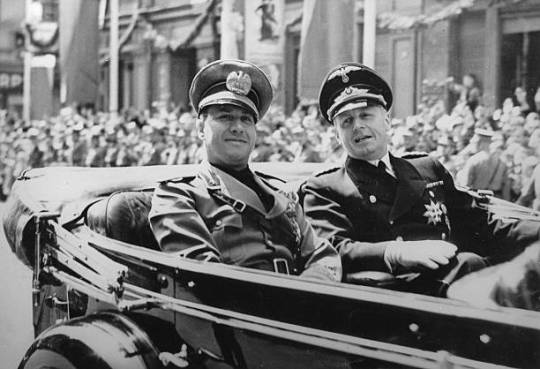
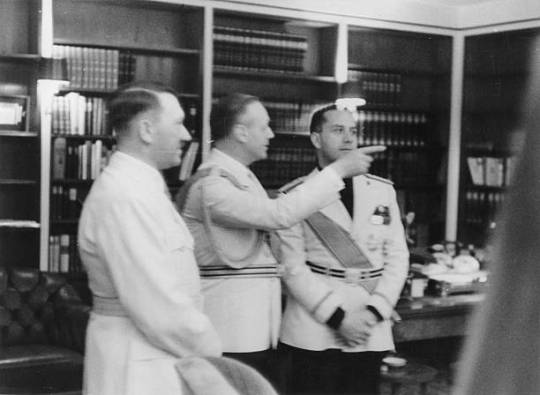
#reichblr#ww2#wwii#ww2 italy#ww2 germany#third reich#3rd reich#fascist italy#galeazzo ciano#ciano#joachim von ribbentrop#von ribbentrop#historical#historical figures#1940s
30 notes
·
View notes
Text
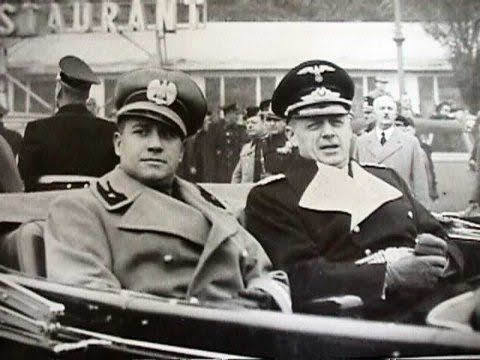
Italian foreign minister Count Galeazzo Ciano and his German counterpart, Joachim von Ribbentrop, Berlin, 1941
19 notes
·
View notes
Text


Слева изображён мой персонаж Герман Фауст(и маленькая распечатка с Гансем Марселем),а справа Иоахим фон Риббентроп
7 notes
·
View notes
Text

Sir my hand empty......
17 notes
·
View notes
Text
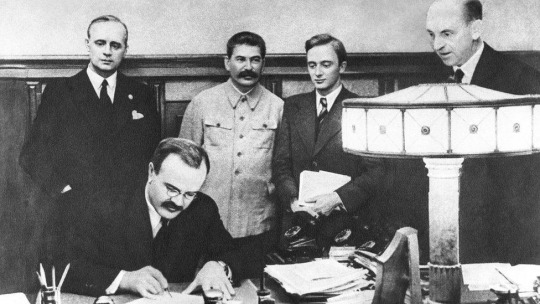
On this day in 1939, Soviet Foreign Minister Vyacheslav Molotov and German Foreign Minister Joachim von Ribbentrop signed the Molotov-Ribbentrop Pact, also known as the N*zi-Soviet Pact, or the Hitler-Stalin Pact.
This was a Treaty of Non-Aggression between Germany and the USSR, meaning that the two countries agreed to not attack each other, as well as divide the countries that were between them, as Germany claimed the west of Poland and the USSR claimed Lithuania.
9 days later, Poland would be invaded by N*zi Germany and World War II started.
This pact would be a broken vow, though, as N*zi Germany would invade the USSR on the 22nd of June 1941, a surprise attack called "Operation Barbarossa."
#tw: n*zi mention!#ussr#germany#vyacheslav molotov#joachim von ribbentrop#molotov-ribbentrop pact#soviet history#german history#history#politics
6 notes
·
View notes
Text
Vaterstolz (ff).
Er geht durch die Decke. Der vorletzte Song über 130.000 Mal aufgerufen, und seit zwei Tagen gibt es → einen neuen “Release”, der auch schon 25.000 Zugriffe hat:
Was kann einen Künstlervater stolzer machen?((Nichts.)) Zumal der nom de plume des Sohnes auf unseren Aufenthalt in der Villa San Michele, Anacapri, zurückgeht, der für DAS WUNDER VON SAN MICHELE die, sagen wir, “klangphysische”…

View On WordPress
#Alban Herbst Faust Kultur#Alban Nikolai Herbst auxcapri#Alban Nikolai Herbst Vater#auxcapri atréju#Auxcapri Dschungel.Anderswelt#auxcapri release#auxcapri spotify#DAS WUNDER VON AN MICHELE Deutschlandfunk#Dschungel.Anderswelt Faustkultur#Künstlervater Adrian v. Ribbentrop#Michael Wollny Joachim Kühn#Możdżer & Baldych#Paolo Rumiz Europa
0 notes
Text

118 notes
·
View notes
Text
Nuremberg Defendants: Part 2, Joachim von Ribbentrop - Nazi Foreign Minister

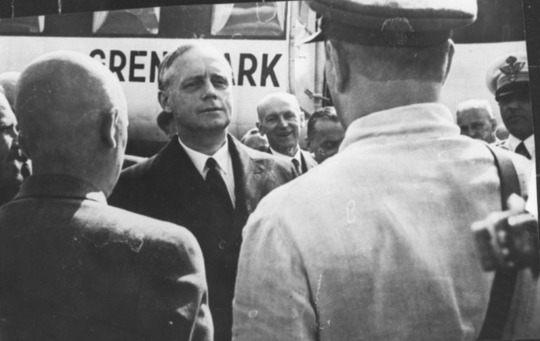
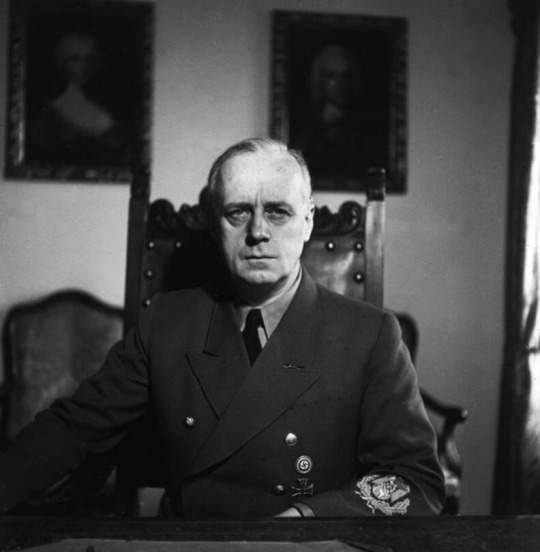
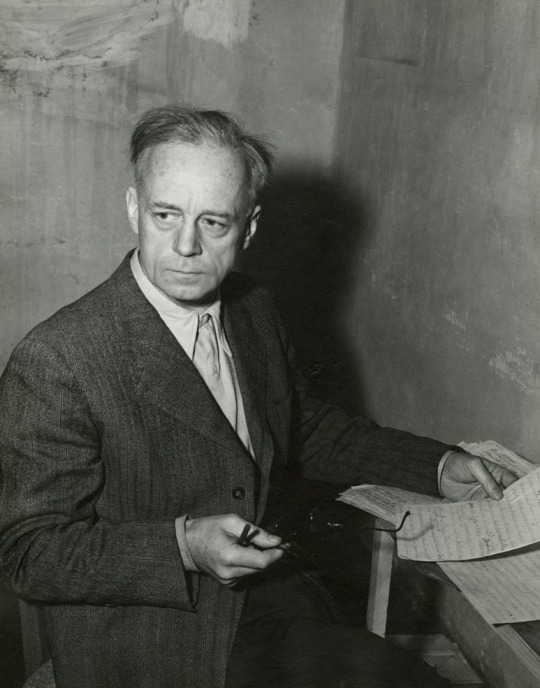
Continuing my Nuremberg Defendants series. Check links to see posts I've made on previous defendants (Hess wasn't part of the series, but I've already made a post about him):
Rudolf Hess
Alfred Rosenberg
-Joachim von Ribbentrop was born as Ulrich Friedrich Willy Joachim Ribbentrop on the 30th of April, 1893. He was not born into aristocracy (his father did not have the “von” in his name), Joachim grew up in an average middle class family with an older brother and a younger sister.
-Ribbentrop's mother died from tuberculosis when he was still very young. This event undoubtedly had an effect on him for the rest of his life (and I will explain in detail as we go further).
-He had no formal education after the age of fifteen. In school Ribbentrop was an underachiever and showed no signs of being an academic. His father had paid for French and English language tutors to teach him both languages.
-At seventeen, Joachim and his brother were sent to London for a year to polish up their English. After that year they both moved to Canada.
-Ribbentrop's life in Canada seemed to have been a happy one. He was popular, invited to many parties and was argued to have been sort of a ladies man. He worked as a banker and also as a construction worker, going on to help the reconstruction of the Quebec Bridge. Ribbentrop also had a passion for dancing and ice skating. he was even a member of a Canadian ice skating team.
-It was during this time that both Ribbentrop and his brother came down with tuberculosis. Ribbentrop's brother died, however Ribbentrop fortunately survived but had to have one of his kidneys removed. The effects of having his kidney removed were very clear. His left eye would sometimes droop, giving the effect of him looking tired. As a result he had a crippling inferiority complex.
-When the Great War broke out, Ribbentrop carefully returned to Germany to fight for his nation. It was during the war when Ribbentrop first met Franz von Papen (who will be the topic of a future post), a man that went on to become Chancellor under the Weimar Republic.
-After the war, Ribbentrop made a living out of his champagne business, which involved smuggling champagne from other countries. At this time, Ribbentrop was friends with Jewish people, even doing business with them. Ribbentrop was the only member of the inner circle that had previously moved around Jewish circles prior to joining the Nazi Party. He had no strong opinions at the time, people knew him as a moderately conservative monarchist. At elections he would vote for the DVP.
-Gradually Ribbentrop's personality began to change. Gone was the polite and somewhat shy young man, now he was becoming more insufferable as he went on long rants on the dangers of communism. What's more is that Ribbentrop had asked his aunt to adopt him aged in his early thirties so he could add the 'von' (a sign of German nobility - his aunt was a 'von Ribbentrop') to his name. His aunt agreed but was required to pay her a regular sum of money. When he stopped paying, his aunt took him to court and forced him to continue paying.
-In 1920, Ribbentrop married Anna Elisabeth Henkell (Annaliese to her friends). Anna's parents were not fond of Ribbentrop and considered him to be an idiot. The marriage produced five children, and Ribbentrop's eldest (Rudolf von Ribbentrop - born 1921) went on to serve in the Second World War as well as writing a book about his father post-war. Anna was a very ambitious woman and often pushed Ribbentrop around in all matters, including political. Hitler noted that it was clearly her who wore the trousers in the relationship.
-Fascinatingly, Ribbentrop didn't join the Nazi Party until 1932, which was around the time that Hitler was starting to get desperate for power. In late 1932, Hitler was using Ribbentrop's house to hold talks with Franz von Papen (as Papen was an old war friend of Ribbentrop's - and at this time Papen had lost his job as Chancellor of Germany, he was looking for a way to return to power. This moment in history is often referred to as the “Backstairs Intrigue”.)
-For the first few years of the Nazi regime, Ribbentrop had no government role. He mostly spent time in Britain and France, trying to establish connections for Hitler. In 1936, he was made Ambassador to Britain after the incumbent had died suddenly of a heart attack. Ribbentrop's appointment was unexpected, nor did he want the role. Prior to becoming ambassador, Ribbentrop was fond of holidaying in Britain and had hoped to one day retire in St Ives in Cornwall.
-He had a very bad reputation as ambassador and was dubbed 'von Brickendrop' due to his multiple gaffes while in this role. His most famous was when he almost knocked over King George VI by doing the Nazi greeting when the King had reached to shake Ribbentrop's hand. He was not well liked by the British Press nor the British public. Throughout his position (which lasted just over a year) he spent no longer than just a few weeks in London, mostly to stay close to his beloved Führer back home. Overall, his experience as Ambassador turned Ribbentrop from being an Anglophile to an Anglophobe.
-In 1938 Ribbentrop was made Foreign Minister, succeeding Konstantin von Neurath (who will be the topic of a future post). This was the position that Ribbentrop had dreamed of (and a position that his long-term enemy, Alfred Rosenberg, had also hoped for). In this role, Ribbentrop had significant influence over Hitler in the early years of World War 2, even encouraging Hitler to invade Poland despite threats from the British as he claimed “they would not fight seriously.” In this post, Ribbentrop's proudest achievement was his Molotov-Ribbentrop Pact (also referred to as the German-Soviet Nonaggression Pact). After the invasion of the Soviet Union in 1941, Ribbentrop gradually lost influence in his role as Foreign Minister.
-Ribbentrop's role in the Final Solution was fairly ambiguous, but he was most certainly aware that atrocities were taking place. Ribbentrop preferred to look the other way and have someone else do the work. From August 1941, Ribbentrop ordered all future communications sent to the Foreign office to be directed to the office of his subordinates. There is no evidence that Ribbentrop intervened in the exterminations, except on one occasion which was purely on the issue of jurisdiction, rather than humanity. Ribbentrop had involved himself in other war crimes, such as legalising and encouraging the lynching of captured Allied bomber crews in Germany. Although the likes of Göring opposed such measures, and the army favoured it in only a few circumstances, Ribbentrop wished to Lynch the perpetrators of 'every type of terror attack on the German population”, despite this being a violation of international law. This was the main charge against him on count 3 of the Nuremberg indictment (war crimes).
-From 1945, Ribbentrop was essentially powerless. After the suicide of Hitler on the 30th of April (ironic because that's also Ribbentrop's birthday), Ribbentrop fled to Flensburg in an attempt to secure a role in the Dönitz government. Ribbentrop was quickly turned down and so fled to Hamburg, where he went by the alias Johann Riese. He was captured by the British after his whereabouts had been exposed. Ribbentrop was discovered asleep, wearing pink and white pyjamas and a small tin of poison attached to his genitals. Upon being woken up, he began to mumble nervously in German, but as soon as he became conscious of the situation, he spoke in perfect English a prepared speech: “The game is up. I congratulate you. You know who I am. If you had come two days later, I would have already given myself up voluntarily.” The British had also discovered a letter written by Ribbentrop to “Vincent Churchill” (not a spelling mistake on my part, that's Ribbentrop's mistake).
-At Nuremberg, Ribbentrop was a depressed and broken man. So much so that his lawyer (Dr Martin Horn) feared he was close to a psychological breakdown. In fact, Ribbentrop was considered one of the worst suicide risks at Nuremberg, and prison Psychiatrist Dr Kelley was instructed to keep a close eye on him. Ribbentrop's first lawyer was Dr Fritz Sauter (who was also acting for Baldur von Schirach - a subject of a future post), however at the start of 1946 he ceased to be his lawyer either because Ribbentrop dismissed him or he resigned out of exasperation (sources differ on this). Ribbentrop was therefore represented by Dr Martin Horn. On the witness stand, Ribbentrop was a mess and had a tendency to ramble and contradict himself.
-Ribbentrop was found guilty on all four counts of the Nuremberg indictment and was sentenced to death by hanging. He spent his last few days closely studying his Bible. After the unexpected suicide of Göring on the night of the executions, Ribbentrop was the first to be hung. On the scaffold his last words were: “God protect Germany, God have mercy on my soul. My final wish is that Germany should recover her unity, and that, for the sake of peace, there should be understanding between East and West.” He then turned to the Protestant Pastor Gerecke and said “I'll see you again.” Ribbentrop's hanging was badly botched, his neck didn't snap when falling through the trapdoor, therefore strangling him to death. Ribbentrop took around 10-20 minutes to die.
28 notes
·
View notes
Text
“How much evil we must do in order to do good,” the theologian Reinhold Niebuhr wrote in 1946. “This, I think, is a very succinct statement of the human situation.” Niebuhr was writing after one global war had forced the victors to do great evil to prevent the incalculably greater evil of a world ruled by its most aggressive regimes. He was witnessing the onset of another global conflict in which the United States would periodically transgress its own values in order to defend them. But the fundamental question Niebuhr raised—how liberal states can reconcile worthy ends with the unsavory means needed to attain them—is timeless. It is among the most vexing dilemmas facing the United States today.
U.S. President Joe Biden took office pledging to wage a fateful contest between democracy and autocracy. After Russia invaded Ukraine, he summoned like-minded nations to a struggle “between liberty and repression, between a rules-based order and one governed by brute force.” Biden’s team has indeed made big moves in its contest with China and Russia, strengthening solidarity among advanced democracies that want to protect freedom by keeping powerful tyrannies in check. But even before the war between Hamas and Israel presented its own thicket of problems, an administration that has emphasized the ideological nature of great-power rivalry was finding itself ensnared by a morally ambiguous world.
In Asia, Biden has bent over backward to woo a backsliding India, a communist Vietnam, and other not so liberal states. In Europe, wartime exigencies have muted concerns about creeping authoritarianism on NATO’s eastern and southern fronts. In the Middle East, Biden has concluded that Arab dictators are not pariahs but vital partners. Defending a threatened order involves reviving the free-world community. It also, apparently, entails buttressing an arc of imperfect democracies and outright autocracies across much of the globe.
Biden’s conflicted strategy reflects the realities of contemporary coalition building: when it comes to countering China and Russia, democratic alliances go only so far. Biden’s approach also reflects a deeper, more enduring tension. American interests are inextricably tied to American values: the United States typically enters into great-power competition because it fears mighty autocracies will otherwise make the world unsafe for democracy. But an age of conflict invariably becomes, to some degree, an age of amorality because the only way to protect a world fit for freedom is to court impure partners and engage in impure acts.
Expect more of this. If the stakes of today’s rivalries are as high as Biden claims, Washington will engage in some breathtakingly cynical behavior to keep its foes contained. Yet an ethos of pure expediency is fraught with dangers, from domestic disillusion to the loss of the moral asymmetry that has long amplified U.S. influence in global affairs. Strategy, for a liberal superpower, is the art of balancing power without subverting democratic purpose. The United States is about to rediscover just how hard that can be.
A DIRTY GAME
Biden has consistently been right about one thing: clashes between great powers are clashes of ideas and interests alike. In the seventeenth century, the Thirty Years’ War was fueled by doctrinal differences no less than by the struggle for European primacy. In the late eighteenth century, the politics of revolutionary France upheaved the geopolitics of the entire continent. World War II was a collision of rival political traditions—democracy and totalitarianism—as well as rival alliances. “This was no accidental war,” German Foreign Minister Joachim von Ribbentrop declared in 1940, “but a question of the determination of one system to destroy the other.” When great powers fight, they do so not just over land and glory. They fight over which ideas, which values, will chart humanity’s course.
In this sense, U.S. competition with China and Russia is the latest round in a long struggle over whether the world will be shaped by liberal democracies or their autocratic enemies. In World War I, World War II, and the Cold War, autocracies in Eurasia sought global primacy by achieving preeminence within that central landmass. Three times, the United States intervened, not just to ensure its security but also to preserve a balance of power that permitted the survival and expansion of liberalism—to “make the world safe for democracy,” in U.S. President Woodrow Wilson’s words. President Franklin Roosevelt made a similar point in 1939, saying, “There comes a time in the affairs of men when they must prepare to defend, not their homes alone, but the tenets of faith and humanity on which their churches, their governments, and their very civilization are founded.” Yet as Roosevelt understood, balancing power is a dirty game.
Western democracies prevailed in World War II only by helping an awful tyrant, Joseph Stalin, crush an even more awful foe, Adolf Hitler. They used tactics, such as fire-bombing and atomic-bombing enemy cities, that would have been abhorrent in less desperate times. The United States then waged the Cold War out of conviction, as President Harry Truman declared, that it was a conflict “between alternative ways of life”; the closest U.S. allies were fellow democracies that made up the Western world. Yet holding the line in a high-stakes struggle also involved some deeply questionable, even undemocratic, acts.
In a Third World convulsed by instability, the United States employed right-wing tyrants as proxies; it suppressed communist influence through coups, covert and overt interventions, and counterinsurgencies with staggering death tolls. To deter aggression along a global perimeter, the Pentagon relied on the threat of using nuclear weapons so destructive that their actual employment could serve no constructive end. To close the ring around the Soviet Union, Washington eventually partnered with another homicidal communist, the Chinese leader Mao Zedong. And to ease the politics of containment, U.S. officials sometimes exaggerated the Soviet threat or simply deceived the American people about policies carried out in their name.
Strategy involves setting priorities, and U.S. officials believed that lesser evils were needed to avoid greater ones, such as communism running riot in vital regions or democracies failing to find their strength and purpose before it was too late. The eventual payoff from the U.S. victory in the Cold War—a world safer from autocratic predation, and safer for human freedom, than ever before—suggests that they were, on balance, correct. Along the way, the fact that Washington was pursuing such a worthy objective, against such an unworthy opponent, provided a certain comfort with the conflict’s ethical ambiguities. As NSC-68, the influential strategy document Truman approved in 1950, put it (quoting Alexander Hamilton), “The means to be employed must be proportioned to the extent of the mischief.” When the West was facing a totalitarian enemy determined to remake humanity in its image, some pretty ugly means could, apparently, be justified.
That comfort wasn’t infinite, however, and the Cold War saw fierce fights over whether the United States was getting its priorities right. In the 1950s, hawks took Washington to task for not doing enough to roll back communism in Eastern Europe, with the Republican Party platform of 1952 deriding containment as “negative, futile, and immoral.” In the 1960s and 1970s, an avalanche of amorality—a bloody and misbegotten war in Vietnam, support for a coterie of nasty dictators, revelations of CIA assassination plots—convinced many liberal critics that the United States was betraying the values it claimed to defend. Meanwhile, the pursuit of détente with the Soviet Union, a strategy that deemphasized ideological confrontation in search of diplomatic stability, led some conservatives to allege that Washington was abandoning the moral high ground. Throughout the 1970s and after, these debates whipsawed U.S. policy. Even in this most Manichean of contests, relating strategy to morality was a continual challenge.
In fact, Cold War misdeeds gave rise to a complex of legal and administrative constraints—from prohibitions on political assassination to requirements to notify congressional committees about covert action—that mostly remain in place today. Since the Cold War, these restrictions have been complemented by curbs on aid to coup makers who topple elected governments and to military units that engage in gross violations of human rights. Americans clearly regretted some measures they had used to win the Cold War. The question is whether they can do without them as global rivalry heats up again.
IDEAS MATTER
Threats from autocratic enemies heighten ideological impulses in U.S. policy by underscoring the clash of ideas that often drives global tensions. Since taking office, Biden has defined the threat from U.S. rivals, particularly China, in starkly ideological terms.
The world has reached an “inflection point,” Biden has repeatedly declared. In March 2021, he suggested that future historians would be studying “the issue of who succeeded: autocracy or democracy.” At root, Biden has argued, U.S.-Chinese competition is a test of which model can better meet the demands of the modern era. And if China becomes the world’s preeminent power, U.S. officials fear, it will entrench autocracy in friendly countries while coercing democratic governments in hostile ones. Just witness how Beijing has used economic leverage to punish criticism of its policies by democratic societies from Australia to Norway. In making the system safe for illiberalism, a dominant China would make it unsafe for liberalism in places near and far.
Russia’s invasion of Ukraine reinforced Biden’s thesis. It offered a case study in autocratic aggression and atrocity and a warning that a world led by illiberal states would be lethally violent, not least for vulnerable democracies nearby. Coming weeks after Chinese President Xi Jinping and Russian President Vladimir Putin had sealed a “no limits” strategic partnership, the Ukraine invasion also raised the specter of a coordinated autocratic assault on the liberal international order. Ukraine, Biden explained, was the central front in a “larger fight for . . . essential democratic principles.” So the United States would rally the free world against “democracy’s mortal foes.”
The shock of the Ukraine war, combined with the steadying hand of U.S. leadership, produced an expanded transatlantic union of democracies. Sweden and Finland sought membership in NATO; the West supported Ukraine and inflicted heavy costs on Russia. The Biden administration also sought to confine China by weaving a web of democratic ties around the country. It has upgraded bilateral alliances with the likes of Japan and Australia. It has improved the Quad (the security and diplomatic dialogue with Australia, India, and Japan) and established AUKUS (a military partnership with Australia and the United Kingdom). And it has repurposed existing multilateral bodies, such as the G-7, to meet the peril from Beijing. There are even whispers of a “three plus one” coalition—Australia, Japan, the United States, plus Taiwan—that would cooperate to defend that frontline democracy from Chinese assault.
These ties transcend regional boundaries. Ukraine is getting aid from Asian democracies, such as South Korea, that understand that their security will suffer if the liberal order is fractured. Democracies from multiple continents have come together to confront China’s economic coercion, counter its military buildup, and constrict its access to high-end semiconductors. The principal problem for the United States is a loose alliance of revisionist powers pushing outward from the core of Eurasia. Biden’s answer is a cohering global coalition of democracies, pushing back from around the margins.
Today, those advanced democracies are more unified than at any time in decades. In this respect, Biden has aligned the essential goal of U.S. strategy, defending an imperiled liberal order, with the methods and partners used to pursue it. Yet across Eurasia’s three key regions, the messier realities of rivalry are raising Niebuhr’s question anew.
CONTROVERSIAL FRIENDS
Consider the situation in Europe. NATO is mostly an alliance of democracies. But holding that pact together during the Ukraine war has required Biden to downplay the illiberal tendencies of a Polish government that—until its electoral defeat in October—was systematically eroding checks and balances. Securing its northern flank, by welcoming Finland and Sweden, has involved diplomatic horse-trading with Turkey’s Recep Tayyip Erdogan, who, in addition to frequently undercutting U.S. interests, has been steering his country toward autocratic rule.
In Asia, the administration spent much of 2021 and 2022 carefully preserving U.S. ties to the Philippines, at the time led by Rodrigo Duterte, a man whose drug war had killed thousands. Biden has assiduously courted India as a bulwark against China, even though the government of Prime Minister Narendra Modi has curbed speech, harassed opposition leaders, fanned religious grievances, and allegedly killed dissidents abroad. And after visiting New Delhi in September 2023, Biden traveled to Hanoi to sign a “comprehensive strategic partnership” with Vietnam’s one-party regime. Once again, the United States is using some communists to contain others.
Then there is the Middle East, where Biden’s “free world” coalition is quite the motley crew. In 2020, Biden threatened to make Saudi Arabia a “pariah” over the murder of the journalist Jamal Khashoggi. By 2023, his administration—panicked by Chinese inroads and rising gas prices—was trying to make that country Washington’s newest treaty ally instead. That initiative, moreover, was part of a concept, inherited from the Trump administration, in which regional stability would rest on rapprochement between Arab autocracies and an Israeli government with its own illiberal tendencies, while Palestinian aspirations were mostly pushed to the side. Not surprisingly, then, human rights and political freedoms receded in relations with countries from Egypt to the United Arab Emirates. Biden also did little to halt the strangulation of democracy in Tunisia—just as he had decided, effectively, to abandon Afghanistan’s endangered democracy in 2021.
Indeed, if 2022 was a year of soaring rhetoric, 2023 was a year of awkward accommodation. References to the “battle between democracy and autocracy” became scarcer in Biden’s speeches, as the administration made big plays that defied that description of the world. Key human rights–related positions at the White House and the State Department sat vacant. The administration rolled back sanctions on Venezuela—an initiative described publicly as a bid to secure freer and fairer elections, but one that was mostly an effort to get an oppressive regime to stop exporting refugees and start exporting more oil. And when a junta toppled the elected government of Niger, U.S. officials waited for more than two months to call the coup a coup, for fear of triggering the cutoff of U.S. aid and thereby pushing the new regime into Moscow’s arms. Such compromises have always been part of foreign policy. But today, they testify to key dynamics U.S. officials must confront.
THE DECISIVE DECADE
First is the cruel math of Eurasian geopolitics. Advanced democracies possess a preponderance of power globally, but in every critical region, holding the frontline requires a more eclectic ensemble.
Poland has had its domestic problems; it is also the logistical linchpin of the coalition backing Ukraine. Turkey is politically illiberal and, often, unhelpful; nonetheless, it holds the intersection of two continents and two seas. In South and Southeast Asia, the primary barrier to Chinese hegemony is a line of less-than-ideal partners running from India to Indonesia. In the Middle East, a picky superpower will be a lonely superpower. Democratic solidarity is great, but geography is stubborn. Across Eurasia, Washington needs illiberal friends to confine its illiberal foes.
The ideological battlefield has also shifted in adverse ways. During the Cold War, anticommunism served as ideological glue between a democratic superpower and its autocratic allies, because the latter knew they were finished if the Soviet Union ever triumphed. Now, however, U.S. enemies feature a form of autocracy less existentially threatening to other nondemocracies: strongmen in the Persian Gulf, or in Hungary and Turkey, arguably have more in common with Xi and Putin than they do with Biden. The gap between “good” and “bad” authoritarians is narrower than it once was—which makes the United States work harder, and pay more, to keep illiberal partners imperfectly onside.
Desperate times also call for morally dexterous measures. When Washington faced no serious strategic challengers after the Cold War, it paid a smaller penalty for foregrounding its values. As the margin of safety shrinks, the tradeoffs between power and principle grow. Right now, war—or the threat of it—menaces East Asia, Europe, and the Middle East. Biden says the 2020s will be the “decisive decade” for the world. As Winston Churchill quipped in 1941, “If Hitler invaded Hell, I would at least make a favorable reference to the Devil in the House of Commons.” When threats are dire, democracies will do what it takes to rally coalitions and keep the enemy from breaking through. Thus, a central irony of Washington’s approach to competition is that the same challenges that activate its ideological energy make it harder to keep U.S. diplomacy pure.
So far, the moral compromises of U.S. policy today are modest compared with those of World War II or the Cold War, in part because the constraints on unsavory methods are stronger than they were when Hitler and Stalin stalked the earth. But rules and norms can change as a country’s circumstances do. So Biden and his successors may soon face a daunting reality: high-stakes rivalries carry countries, and leaders, to places they never sought to go.
When the Cold War started, few officials imagined that Washington would conduct covert interventions from Afghanistan to Angola. Just three years ago, hardly anyone predicted that the United States would soon fight a proxy war meant to bleed Putin’s army to death in Ukraine. As the present competitions intensify, the tactics used to wage them could become more extreme.
Washington could find itself covertly trying to tip the balance in elections in some crucial swing state if the alternative is seeing that country shift hard toward Moscow or Beijing. It could use coercion to keep Latin America’s military facilities and other critical infrastructure out of Chinese hands. And if the United States is already ambivalent about acknowledging coups in out-of-the-way countries, perhaps it would excuse far greater atrocities committed by a more important partner in a more important place.
Those who doubt that Washington will resort to dirty tricks have short memories and limited imaginations. If today’s competitions will truly shape the fate of humanity, why wouldn’t a vigilant superpower do almost anything to come out on top?
DON’T LOSE YOURSELF
There’s no reason to be unduly embarrassed about this. A country that lacks the self-confidence to defend its interests will lack the power to achieve any great purpose in global affairs. Put differently, the damage the United States does to its values by engaging dubious allies, and engaging in dubious behavior, is surely less than the damage that would be done if a hyperaggressive Russia or neototalitarian China spread its influence across Eurasia and beyond. As during the Cold War, the United States can eventually repay the moral debts it incurs in a lengthy struggle—if it successfully sustains a system in which democracy thrives because its fiercest enemies are suppressed.
It would be dangerous to adopt a pure end-justifies-the-means mentality, however, because there is always a point at which foul means corrupt fair ends. Even short of that, serial amorality will prove politically corrosive: a country whose population has rallied to defend its values as well as its interests will not forever support a strategy that seems to cast those values aside. And ultimately, the greatest flaw of such a strategy is that it forfeits a potent U.S. advantage.
During World War II, as the historian Richard Overy has argued, the Allied cause was widely seen to be more just and humane than the Axis cause, which is one reason the former alliance attracted so many more countries than the latter. In the Cold War, the sense that the United States stood, however imperfectly, for fundamental rights and liberties the Kremlin suppressed helped Washington appeal to other democratic societies—and even to dissidents within the Soviet bloc. The tactics of great-power competition must not obscure the central issue of that competition. If the world comes to see today’s rivalries as slugfests devoid of larger moral meaning, the United States will lose the asymmetry of legitimacy that has served it well.
This is not some hypothetical dilemma. Since October 2023, Biden has rightly framed the Israel-Hamas war as a struggle between a flawed democracy and a tyrannical enemy seeking its destruction. There is strong justification, moral and strategic, for backing a U.S. ally against a vicious proxy of a U.S. enemy, Iran. Moreover, there is no serious ethical comparison between a terrorist group that rapes, tortures, kidnaps, and kills civilians and a country that mostly tries, within the limits war imposes, to protect them.
Yet rightly or wrongly, large swaths of the global South view the war as a testament to American double standards: opposing occupation and appropriation of foreign territory by Russia but not by Israel, valuing the lives and liberties of some victims more than those of others. Russian and Chinese propagandists are amplifying these messages to drive a wedge between Washington and the developing world. This is why the Biden administration has tried, and sometimes struggled, to balance support for Israel with efforts to mitigate the harm the conflict brings—and why the war may presage renewed U.S. focus on the peace process with the Palestinians, as unpromising as that currently seems. The lesson here is that the merits of an issue may be disputed, but for a superpower that wears its values on its sleeve, the costs of perceivedhypocrisy are very real.
RULES FOR RIVALRY
Succeeding in this round of rivalry will thus require calibrating the moral compromises inherent in foreign policy by finding an ethos that is sufficiently ruthless and realistic at the same time. Although there is no precise formula for this—the appropriateness of any action depends on its context—some guiding principles can help.
First, morality is a compass, not a straitjacket. For political sustainability and strategic self-interest, American statecraft should point toward a world consistent with its values. But the United States cannot paralyze itself by trying to fully embody those values in every tactical decision. Nor—even at a moment when its own democracy faces internal threats—should it insist on purifying itself at home before exerting constructive influence abroad. If it does so, the system will be shaped by regimes that are more ruthless—and less shackled by their own imperfections.
The United States should also avoid the fallacy of the false alternative. It must evaluate choices, and partners, against the plausible possibilities, not against the utopian ideal. The realistic alternative to maintaining ties to a military regime in Africa may be watching as murderous Russian mercenaries fill the void. The realistic alternative to engaging Modi’s India may be seeing South Asia fall further under the shadow of a China that assiduously exports illiberalism. Similarly, proximity to a Saudi regime that carves up its critics is deeply uncomfortable. But the realistic alternative to Saudi Crown Prince Mohammed bin Salman is probably a regime that remains quite repressive—and is far less committed to empowering women, curbing religious zealots, and otherwise making the country a more open, tolerant place. In a world of lousy options, the crucial question is often: Lousy compared with what?
Another guiding principle: good things don’t all come at once. Cold War policymakers sometimes justified coup making and support for repressive regimes on grounds that preventing Third World countries from going communist then preserved the possibility that they might go democratic later. That logic was suspiciously convenient—and, in many cases, correct. Countries in Latin America and other developing regions did eventually experience political openings as they reached higher levels of development, and democratic values radiated outward from the West.
Today, unseemly bargains can sometimes lead to better outcomes. By not breaking the U.S.-Philippine alliance during Duterte’s drug war, Washington sustained the relationship until a more cooperative, less draconian government emerged. By staying close to a Polish government with some worrying tendencies, the United States bought time until, late last year, that country’s voters elected a coalition promising to strengthen its democratic institutions. The same argument could be made for staying engaged with other democracies where autocratic tendencies are pronounced but electoral mechanisms remain intact—Hungary, India, and Turkey, to name a few. More broadly, liberalism is most likely to flourish in a system led by a democracy. So simply forestalling the ascent of powerful autocracies may eventually help democratic values spread into once inhospitable places.
Similarly, the United States should remember that taking the broad view is as vital as taking the long view. Support for democracy and human rights is not an all-or-nothing proposition. As Biden’s statecraft has shown, transactional deals with dictators can complement a strategy that stresses democratic cooperation at its core. Honoring American values, moreover, is more than a matter of hectoring repressive regimes. A foreign policy that raises international living standards through trade, addresses global problems such as food insecurity, and holds the line against great-power war serves the cause of human dignity very well. A strategy that emphasizes such efforts may actually be more appealing to countries, including developing democracies from Brazil to Indonesia, that resist democracy-versus-autocracy framing because they don’t want any part of a Manichean fight.
Of course, these principles can seem like a recipe for rationalization—a way of excusing the grossest behavior by claiming it serves a greater cause. Another important principle, then, revives Hamilton’s dictum that the means must be proportioned to the mischief. The greater the compromise, the greater the payoff it provides—or the damage it avoids—must be.
By this standard, the case for cooperation with an India or a Poland is clear-cut. These countries are troubled but mostly admirable democracies that play critical roles in raging competitions. Until the world contains only liberal democracies, Washington can hardly avoid seeking blemished friends.
The United States should, however, be more cautious about courting countries that regularly engage in the very practices it deems most corrosive to the liberal order: systematic torture or murder of their people, coercion of their neighbors, or export of repression across borders, to name a few. A Saudi Arabia, for instance, that periodically engages in some of these practices is a troublesome partner. A Saudi Arabia that flagrantly and consistently commits such acts risks destroying the moral and diplomatic basis of its relationship with the United States. American officials should be more hesitant still to distort or destabilize the politics of other countries, especially other democracies, for strategic gain. If Washington is going to get back into the coup business in Latin America or Southeast Asia, the bad outcomes to be prevented must be truly severe—a major, potentially lasting shift in a key regional balance of power, perhaps—to justify policies so manifestly in tension with the causes the United States claims to defend.
Mitigating the harm to those causes means heeding a further principle: marginal improvement matters. Washington will not convince leaders in Turkey, the United Arab Emirates, or Vietnam to commit political suicide by abandoning their domestic model. But leverage works both ways in these relationships. Countries on the firing line need a superpower patron just as much as it needs them. U.S. officials can use that leverage to discourage extraterritorial repression, seek the release of political prisoners, make elections a bit freer and fairer, or otherwise obtain modest but meaningful changes. Doing so may be the price of keeping these relationships intact, by convincing proponents of human rights and democracy in Congress that the White House has not forgotten such issues altogether.
This relates to an additional principle: the United States must be scrupulously honest with itself. American officials need to recognize that illiberal allies will be selective or unreliable allies because their domestic models put them at odds with important norms of the liberal order—and because they tend to generate resentment that may eventually cause an explosion. In the same vein, the problem with laws that mandate aid cutoffs to coup plotters is that they encourage self-deception. In cases in which Washington fears the strategic fallout from a break in relations, U.S. officials are motivated to pretend that a coup has not occurred. The better approach, in line with reforms approved by Congress in December 2022, is a framework that allows presidents to waive such cutoffs on national security grounds—but forces them to acknowledge and justify that choice. The work of making moral tradeoffs in foreign policy begins with admitting those tradeoffs exist.
Some of these principles are in tension with others, which means their application in specific cases must always be a matter of judgment. But the issue of reconciling opposites relates to a final principle: soaring idealism and brutal realism can coexist. During the 1970s, moral debates ruptured the Cold War consensus. During the 1980s, U.S. President Ronald Reagan adequately repaired—but never fully restored—that consensus by combining flexibility of tactics with clarity of purpose.
Reagan supported awful dictators, murderous militaries, and thuggish “freedom fighters” in the Third World, sometimes through ploys—such as the Iran-contra scandal—that were dodgy or simply illegal. Yet he also backed democratic movements from Chile to South Korea; he paired rhetorical condemnations of the Kremlin with ringing affirmations of Western ideals. The takeaway is that rough measures may be more tolerable if they are part of a larger package that emphasizes, in word and deed, the values that must anchor the United States’ approach to the world. Some will see this as heightening the hypocrisy. In reality, it is the best way to preserve the balance—political, moral, and strategic—that a democratic superpower requires.
44 notes
·
View notes
Text
Honest Reactions to "I want a baby"

Do I feel bad after creating this? No, but I'm planning to do more of them because I LOVE making these.
Please take this as a joke.
#reichblr#wwii#wwii germany#meme#wwii meme#ww2#ww2 memes#adolf hitler#heinrich himmler#joseph goebbels#martin bormann#reinhard heydrich#joachim peiper#joachim von ribbentrop#albert speer#rudolf hess#hermann goering#michael wittmann
182 notes
·
View notes
Text











Winston Churchill: The Wilderness Years - ITV - September 6, 1981 - October 25, 1981
Drama (8 Episodes)
Running Time: 60 minutes
Stars:
Robert Hardy as Winston Churchill
Siân Phillips as Clementine Churchill
Nigel Havers as Randolph Churchill
Tim Pigott-Smith as Brendan Bracken
David Swift as Professor Lindemann
Sherrie Hewson as Mrs. Pearman
Moray Watson as Major Desmond Morton
Paul Freeman as Ralph Wigram
Frank Middlemass as Lord Derby
Sam Wanamaker as Bernard Baruch
Peter Barkworth as Stanley Baldwin
Eric Porter as Neville Chamberlain
Edward Woodward as Sir Samuel Hoare
Peter Vaughan as Sir Thomas Inskip
Robert James as Ramsay MacDonald
Tony Mathews as Anthony Eden
Ian Collier as Harold Macmillan
Marcella Markham as Nancy Astor
Walter Gotell as Lord Swinton
Richard Murdoch as Lord Halifax
Clive Swift as Sir Horace Wilson
Phil Brown as Lord Beaverbrook
Diane Fletcher as Ava Wigram
Geoffrey Toone as Sir Louis Kershaw
Norman Jones as Clement Attlee
Geoffrey Chater as Lord Hailsham
Stratford Johns as Lord Rothermere
Norman Bird as Sir Maurice Hankey
Roger Bizley as Ernst Hanfstaengl
James Cossins as Lord Lothian
Guy Deghy as King George V
Stephen Elliott as William Randolph Hearst
Günter Meisner as Adolf Hitler
Frederick Jaeger as Joachim von Ribbentrop
David Langton as Lord Londonderry
Preston Lockwood as Austen Chamberlain
David Markham as the Duke of Marlborough
Richard Marner as Ewald von Kleist-Schmenzin
Llewellyn Rees as Lord Salisbury
Terence Rigby as Thomas Barlow
Margaret Courtenay as Maxine Elliott
Merrie Lynn Ross as Marion Davies
Nigel Stock as Admiral Domvile
#Winston Churchill: The Wilderness Years#TV#ITV#Drama#1981#1980's#Robert Hardy#Sian Phillips#Nigel Havers#Peter Barkworth#Eric Porter#Sam Wannamaker#Edward Woodward
2 notes
·
View notes
Text
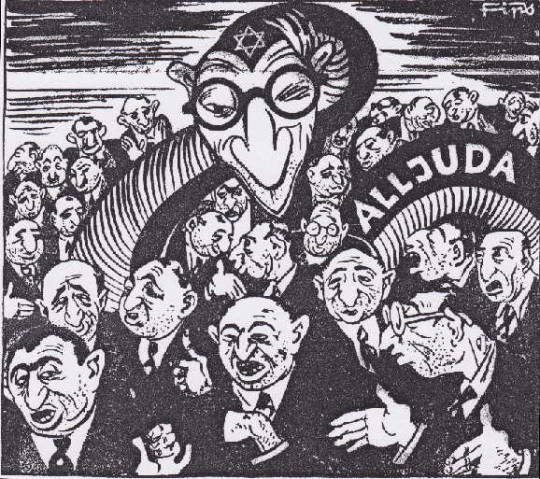
L’état négroïde américain a une nouvelle fois bloqué une résolution du Conseil de Sécurité de l’ONU en faveur d’un cessez-le-feu à Gaza.
Du point de cet état golem, les juifs n’ont pas encore assez exterminé de civils. D’ailleurs, la créature congoïde qui représente les États-Unis à l’ONU a indiqué que son gouvernement souhaitait une SOLUTION FINALE à la question palestinienne.
Concrètement donc, l’extermination totale de la population autochtone.
En diplomatie, chaque mot est soigneusement soupesé. Le choix de ce terme est une allusion à l’expression attribuée d’ordinaire aux nationaux-socialistes allemands à propos du soi-disant « génocide des juifs ».
En reprenant un des piliers du mythe de l’holocauste, les juifs veulent évidemment un message clair adressé au monde : ils vont procéder à la destruction pure et simple de la population non-juive de Palestine. Les survivants, s’il en reste, devront fuir partout où ils peuvent.
Les gens ignorent que l’Allemagne nationale-socialiste n’a jamais envisagé de « solution finale » à la question juive au sens où il se serait agi d’éradiquer les juifs d’Europe en totalité. Le 31 juillet 1941, Hermann Göring écrit un ordre de mission à Reinhard Heydrich, chef de la sécurité intérieure du Reich, afin qu’il procède à la « solution globale » de la question juive (« gesamtlösung ») par « l’émigration et l’évacuation de la manière la plus favorable possible ». À cette fin, Hermann Göring enjoint Reinhard Heydrich de lui soumettre rapidement « un plan d’ensemble indiquant les mesures préliminaires d’organisation, de fond et de financement ».
Martin Luther, chef du département « Allemagne » du ministère des Affaires étrangères, était en charge de coordonner la politique juive de l’Allemagne avec les autres gouvernements européens. À ce titre, il participe à la réunion de travail de Wannsee le 20 janvier 1942 qui n’a d’ailleurs jamais été l’espèce de conférence extraordinaire présentée aux masses par la suite. Le 21 août 1942, il rédige un memorandum qui résume la politique allemande dans ce domaine depuis 1939. Il évoque une « solution territoriale finale » à la question juive en citant une lettre de Reinhard Heydrich adressée le 24 juin 1940 à Joachim von Ribbentrop, ministre des Affaires étrangères allemand (« eine territorial Endlösung wäre nötig »).
Martin Luther indique que l’expulsion des juifs vers la Pologne est temporaire : « L’évacuation vers le Gouvernement général est une mesure provisoire. Les Juifs seront transportés vers les territoires occupés de l’Est dès que les conditions techniques le permettront » (« Der Abtransport nach dem Generalgouvernement ist eine vorläufige Massnahme. Die Juden werden nach den besetzten Ostgebieten weiter befördert, sobald die technischen Voraussetzungan dazu gegeben sind »).
Dans les territoires sous contrôle allemand, les juifs ont effectivement été arrêtés et expulsés vers la Pologne afin d’être mis au travail pour l’effort de guerre. Sitôt la guerre finie, l’essentiel de ces juifs est repartie en Europe, en Amérique et en Palestine.
Si les juifs n’ont donc jamais été victimes d’on ne sait quel entreprise génocidaire généralisée, ils ont établi leur féroce dictature raciale sur ce mensonge extraordinaire, extorquant une véritable impunité universelle grâce à un martyre de pure fiction.
Enivrés de ce délire mensonger, galvanisés par leur fanatisme, ils veulent désormais appliquer à leurs victimes ce dont ils accusent de manière éhontée l’Allemagne nationale-socialiste. Et je dois dire, avec le recul que nous avons sur ce sujet, que l’extrême retenue de l’Allemagne nationale-socialiste à l’égard de la race juive a été une sérieuse erreur historique, une erreur que l’humanité ne pourra pas supporter une seconde fois.
Il n’y a effectivement aucune solution territoriale à la question juive. Même refoulés dans un coin du Proche-Orient, ils sont sur le point de plonger l’ensemble du monde dans une catastrophique guerre mondiale contre l’Iran et la Russie.
On ne peut comparer le juif qu’au virus de la rage. Si l’on peut tolérer, dans une certaine mesure, que des nuisibles existent, comme les renards ou les sangliers, le virus de la rage ne peut rencontrer qu’une entreprise sanitaire déterminée à le juguler.
C’est là que nous en sommes, en 2024.
Si nous laissons ces juifs libres de déambuler, ils plongeront le monde dans la misère et la ruine, bien plus encore qu’actuellement.
Cette question juive doit être résolue. Une fois résolue, l’organisme retrouvera la santé et l’équilibre social reviendra.

4 notes
·
View notes
Text
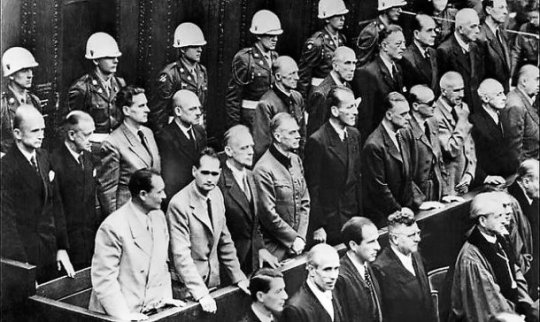
El 1 de Octubre de 1946, finalizaba un hito de la historia universal, aunque aún existen dudas sobre si fue un bastión de jurisprudencia o uno de los atropellos legales mas abominables, ese día terminaban los "juicios de Nüremberg". Consumada la derrota Alemana de la segunda guerra mundial, y ante el estupor universal por las atrocidades cometidas por el régimen nazi, los aliados vencedores coincidieron en que había que generar un shock jurídico para desalentar futuros brotes megalómanos con devastadores consecuencias. Por ello en 20 de Noviembre de 1945 se inició un proceso legal sin precedentes a los responsables alemanes de los aberrantes crímenes de la segunda guerra mundial. De los mas de 4.000 acusados, solo 611 fueron llevados a juicio, entre los mas importantes estaban Hermann Goering, Alfred Jodl, Rudolf Hess, Joachim von Ribbentrop, Wilhelm Keitel, Karl Doenitz, Wilhelm Frick, Erich Raeder, Baldur von Schirach y Fritz Sauckel. Se tipificaron delitos anteriormente inexistentes como "Crimen de guerra", "Crimen contra la humanidad", "Genocidio" y "Guerra de agresión". El tribunal estaba compuesto por Geoffrey Lawrence de Inglaterra, Francis Biddle de los EEUU, Henri Donnedieu de Vabres de Francia y Iona Nikítchenko de la URSS. El 1 de Octubre de 1946 el tribunal encontró culpables a la mayoría de los acusados, de los 24 principales jerarcas nazis cuales 11 fueron condenados a muerte y 3 a cadena perpetua, el resto corrió suerte dispar entre condenas menores y la absolución. A este juicio le siguieron otros 12 procesos mas contra responsables militares de menor rango y a civiles colaboracionistas. Pese a la necesidad de castigar los crímenes mas horrendos de la historia universal, el proceso ni siquiera rozó la legalidad. Los acusados fueron juzgados por sus enemigos militares, responsables de crímenes similares, era inverosímil ver un representante de la URSS juzgando a responsables de crímenes de guerra. Los alemanes no fueron acusados de asesinatos, torturas u otros hechos legalmente tipificados, sino de crímenes definidos como tales con posterioridad a ser cometidos, las pruebas presentadas no necesitaban ser certificadas y no había recusación ni apelación. El propio peso de las atrocidades cometidas hicieron que legalmente nadie objetara las irregularidades del proceso, aunque se lo conoce como "El juicio sin ley" los victimarios de 6 millones de judíos masacrados de manera aberrante merecían un castigo aunque no se guardaran las formas. Adolf Eichmann, Martin Bormann y Josef Mengele fueron juzgados en ausencia, luego se descubrió que Bormann había muerto en la defensa de Berlín. Eichmann en cambio había podido refugiarse en la Argentina, años mas tarde el MOSSAD lo encontró y trasladó a Israel donde fue ejecutado. Por su parte Mengele nunca fue capturado y murió de causas naturales en una playa del Brasil.
Web
11 notes
·
View notes